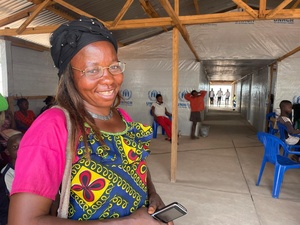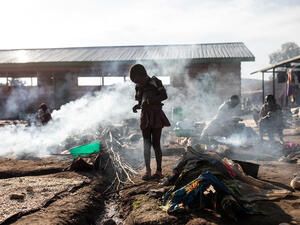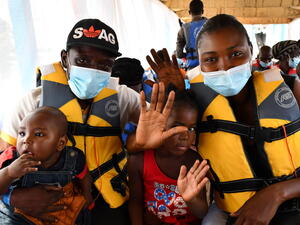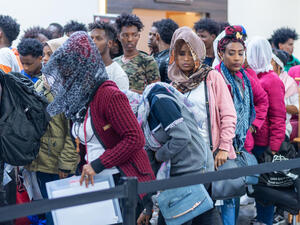Timor: repatriation picks up after lull
Timor: repatriation picks up after lull
After an all time low last week, this week the repatriation operation from West Timor is picking up. Monday and today (Tuesday), 2,137 refugees have returned home by air and by land, according to UNHCR and IOM. Yesterday, 1,122 returned to East Timor and today another 1,015 went back, the majority departing from Atambua in organised overland repatriation.Hopes for the speedy return of East Timorese refugees in militia-controlled camps in West Timor have been raised by Sunday's border meeting between CNRT president Xanana Gusmão and militia leader, João Da Silva Tavares. Yesterday, Tavares announced the disbanding of his militia group. At a ceremony held at Haliwen refugee settlement, which was attended by 2,000 militiamen, Tavares urged his supporters to abandon violence and return home to pursue their objectives by peaceful means.
UNHCR field officers in Atambua are predicting a significant increase in the number of returnees in the next few days. However, they say torrential rains are washing away roads and bridges, further complicating the repatriation operation.
For the second week running, UNHCR staff have been entering Naibonat, Noel Baki and Tua Pukan camps in West Timor without any problems. In Naibonat, staff distributed 800 family kits to vulnerable refugees. The kits contain sleeping mats, kitchen sets, plastic buckets, jerry cans and plastic sheets.
While some militia intimidation continues, there has been a noticeable relaxation of tensions in some camps in West Timor in recent days, according to UNHCR staff
As part of its mass information campaign to promote repatriation, UNHCR has screened a video, entitled "Back Home," in Naibonat camp. Although UNHCR was told that few refugees would attend the screening, some 400 persons turned up to see the video. The video features interviews with CNRT President Gusmão, Bishop Belo, UNTAET Chief Sergio Vieira de Mello and INTERFET Commander Cosgrove. The refugees cheered when Bishop Belo appeared on the screen. The question and answer session that ensued revealed interest in repatriation but also concerns about safety upon return. The 20-minute video was shown on four consecutive days in Naibonat and will be used in other sites to inform refugees about repatriation and conditions in East Timor. UNHCR is bolstering its capacity to continue using video, printed matter, radio announcements and presentations as part of its information campaign.
Heavy rains have also had an impact on the rate of repatriation. High water levels are making roads already in poor condition impassable. Large vehicles used for returnee movements, secondary movements within East Timor and the delivery of relief supplies have contributed to the degradation of roads.
Since 7 October, 116,566 people have returned from West to the East Timor, 74,581 in an organized manner with the assistance of UNHCR and IOM, while 41,985 did it spontaneously.







